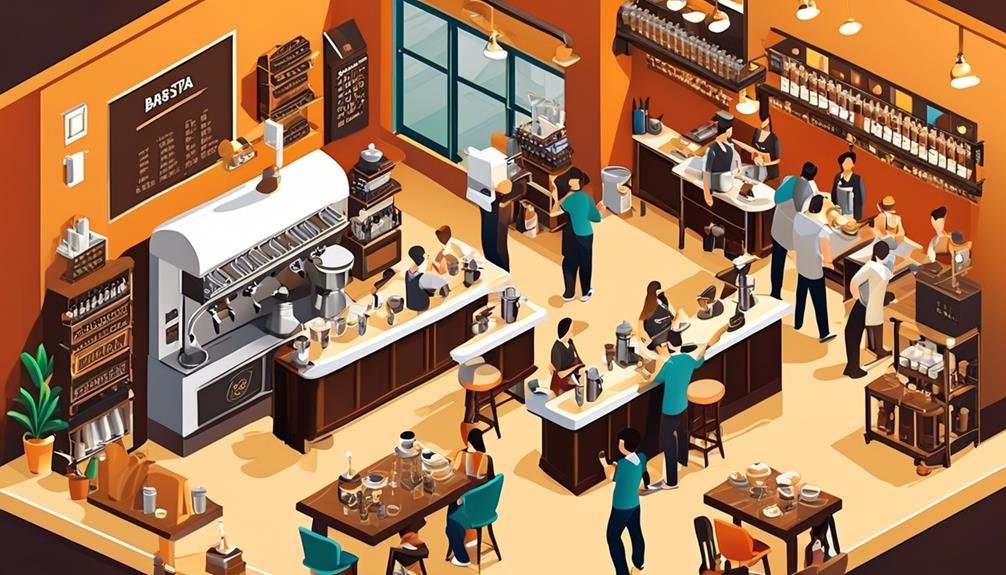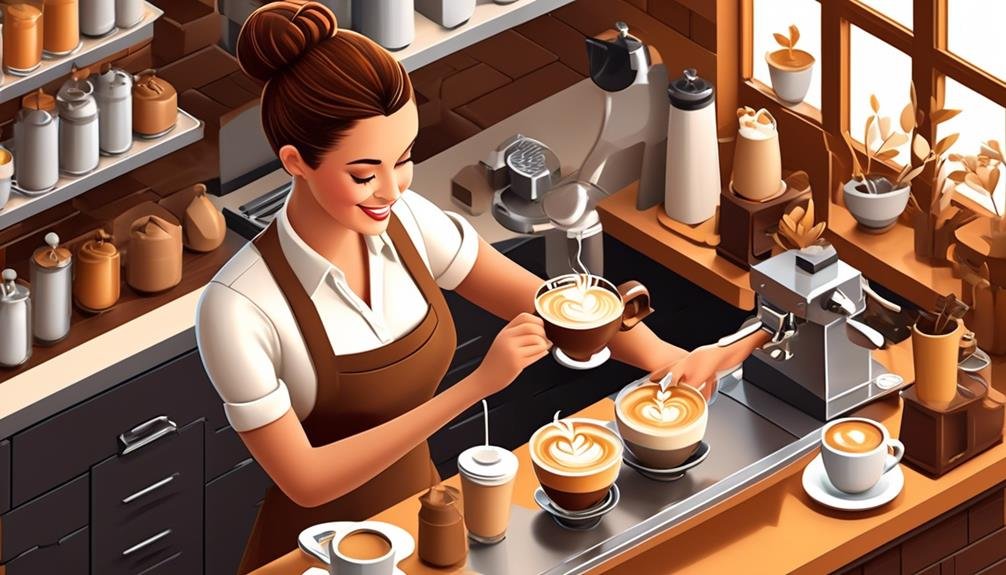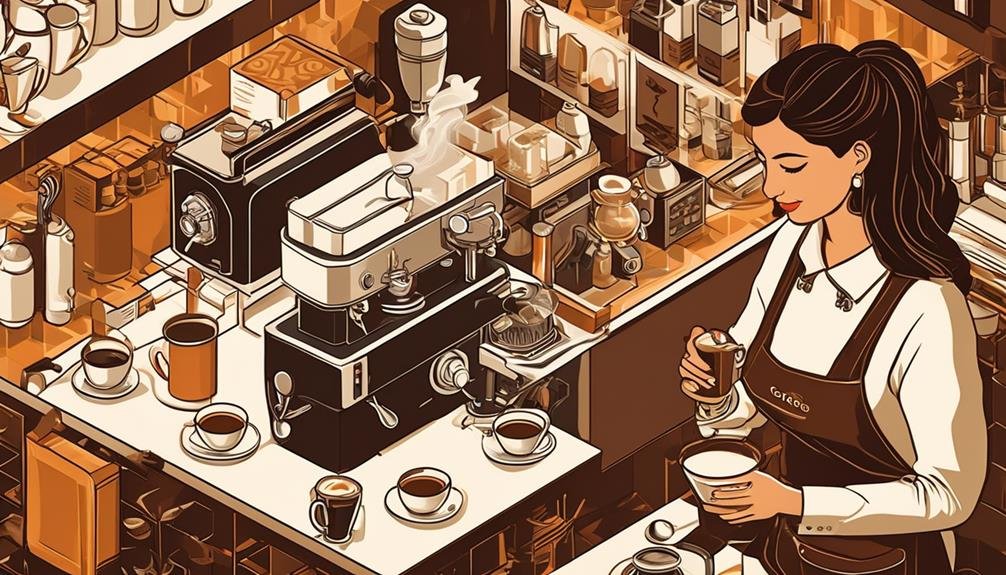Imagine walking into your favorite neighborhood café, greeted by the tantalizing aroma of freshly brewed coffee. As you approach the counter, you notice the skilled barista effortlessly crafting intricate latte art while engaging in friendly conversation with customers.
How do you become a professional barista like them? In this discussion, we will explore the steps and skills required to embark on a journey towards becoming a master of the coffee craft.
From cultivating a passion for coffee to honing your brewing techniques, this guide will provide you with valuable insights on how to turn your love for coffee into a fulfilling career.
So, grab a cup of your favorite brew and let's dive into the world of professional barista expertise.
Key Takeaways
- Immerse yourself in the world of coffee by attending events, visiting farms, and engaging with the local coffee community to cultivate a passion for coffee and develop a discerning palate.
- Familiarize yourself with coffee beans, roast profiles, brewing techniques, and espresso-based drinks to learn the barista basics.
- Enroll in a barista training course to gain hands-on experience, practical skills, and necessary expertise for a barista career.
- Gain real-world experience by working with different coffee machines, learning from customer interactions, seeking mentorship, and embracing on-the-job learning to develop exceptional customer service skills and understand the demands and challenges of the industry.
Cultivating a Passion for Coffee
To truly cultivate a passion for coffee, immerse yourself in its world, attending events, visiting farms, and engaging with communities that share your love for this aromatic and complex beverage. Becoming a professional barista goes beyond just making a good cup of joe; it requires a deep appreciation for the craft and a genuine love for coffee.
By actively participating in coffee-related events, such as coffee competitions or festivals, you can surround yourself with like-minded individuals who share your enthusiasm. These events provide an opportunity to learn from seasoned professionals, exchange ideas, and gain valuable insights into the world of coffee.
Visiting coffee farms is another excellent way to deepen your connection with coffee. By witnessing the entire process, from seed to cup, you can gain a greater appreciation for the hard work and dedication that goes into producing high-quality beans.
Engaging with the local coffee community can also be incredibly beneficial. Coffee shops often serve as hubs for passionate coffee lovers, offering a space to connect with others and share knowledge and experiences. By frequenting these establishments, you can learn from experienced baristas, taste a variety of coffees, and expand your palate.
Cultivating a passion for coffee involves exploring different brewing methods and understanding their impact on the flavor profile. Experimenting with various techniques, such as pour-over, espresso, or cold brew, allows you to develop a deeper understanding of how each method brings out different nuances in the coffee.
Exploring different coffee origins is also essential in developing a well-rounded knowledge of coffee. Each origin offers unique flavors and characteristics, influenced by factors such as climate, altitude, and soil composition. By exploring the diverse world of coffee, you can discover new flavors and expand your love for this remarkable beverage.
Developing a discerning palate is crucial for any aspiring barista. Tasting and analyzing different coffee flavors, aromas, and textures allows you to identify the subtleties and complexities that make each cup of coffee unique. Paying attention to the acidity, sweetness, body, and aftertaste of the coffee can help you refine your sensory skills and better understand the intricacies of the brew.
Understanding the various factors that influence coffee's taste is also essential. Learning about processing methods, roast levels, and bean varieties can provide valuable insights into the science behind the perfect cup of coffee. By acquiring this knowledge, you can confidently navigate the world of coffee and become a professional barista who not only serves exceptional coffee but also shares a genuine passion for the craft.
Learning the Barista Basics
Immerse yourself in the world of coffee by learning the barista basics.
- Familiarize yourself with coffee beans and roast profiles: Begin your journey by exploring the different types of coffee beans and their unique flavor profiles. Learn about the various roasting techniques and how they affect the taste of the final cup.
- Learn brewing techniques: Dive into the intricacies of brewing coffee by studying the different methods, such as pour-over, French press, and espresso. Understand the variables that impact extraction, such as grind size, water temperature, and brew time.
- Understand different espresso-based drinks: Discover the world of espresso and its variations, like cappuccinos, lattes, and macchiatos. Learn the proper ratios of espresso, milk, and foam to create a balanced and delicious beverage.
- Master milk steaming and frothing techniques: Develop the skill of steaming milk to create velvety smooth microfoam. Perfect your technique to achieve the ideal temperature and texture for different drinks.
- Practice the art of latte art: Enhance your creations by learning the art of latte art, where you can express your creativity by pouring intricate designs on the surface of the coffee.
Enrolling in a Barista Training Course

Consider enrolling in a professional barista training course to take your coffee skills to the next level and pave the way for a successful career in the world of specialty coffee. By enrolling in a barista training course, you will have the opportunity to learn from experienced baristas in the industry and gain practical skills needed for working in a fast-paced coffee shop environment. These comprehensive programs typically cover espresso preparation, latte art, customer service, and coffee shop management.
Here is a table that outlines the benefits of enrolling in a barista training course:
| Benefits of Enrolling in a Barista Training Course |
|---|
| Gain hands-on experience and practical skills |
| Learn brewing techniques and different espresso-based drinks |
| Acquire knowledge in milk steaming and frothing techniques |
| Obtain the necessary expertise and certification for a barista career |
A barista training course will provide you with the necessary knowledge in brewing techniques and different espresso-based drinks. You will also learn how to steam and froth milk to perfection, a skill that is essential for creating beautiful latte art. Additionally, these courses often offer opportunities to learn from experienced baristas who can share their insights and tips for success in the coffee industry.
Upon completion of a barista training course, you will have the expertise and certification required to pursue a career as a professional barista. This certification will not only enhance your job prospects but also demonstrate your commitment and passion for the craft of specialty coffee. So, why wait? Enroll in a barista training course today and embark on a journey towards becoming a skilled and knowledgeable barista in the thriving world of specialty coffee.
Gaining Real-World Experience
Gain practical experience and refine your coffee skills by seeking opportunities to work in coffee shops or cafes. This is where you'll truly learn what it takes to be a professional barista.
Here are some key ways you can gain real-world experience:
- Work with different coffee machines: By working in different coffee shops or cafes, you'll have the chance to familiarize yourself with various coffee machines. Each machine operates differently, and understanding their nuances is essential for making great coffee.
- Learn from customer interactions: Working in a fast-paced environment will expose you to a wide range of customer interactions. This will teach you how to handle different situations and how to apply your coffee knowledge effectively while maintaining excellent customer service.
- Seek mentorship from experienced baristas: Seasoned baristas can offer invaluable insights and guidance. Take the opportunity to learn from their experiences and expertise, and ask them questions to deepen your understanding.
- Embrace on-the-job learning: Pay attention to the techniques and methods used by experienced professionals. Take the time to observe and learn everything you can from them. This hands-on approach will allow you to improve your skills and develop your own style.
Gaining real-world experience is crucial for any aspiring barista. It's through this practical experience that you'll truly learn the art of making great coffee. So don't hesitate to immerse yourself in the world of coffee shops and cafes, as it's here that you'll gain the skills necessary to become a professional barista.
Developing Exceptional Customer Service Skills

Now that you have gained real-world experience and refined your coffee skills, it's time to shift your focus towards developing exceptional customer service skills. As a barista, the quality of your customer service can make or break a customer's experience at a coffee bar. It's important to offer a variety of coffee options, but it's equally important to create a warm and welcoming atmosphere for your customers.
To develop exceptional customer service skills, start by cultivating strong communication skills. Engage effectively with customers by actively listening to their needs and preferences. Strive to exceed their expectations by providing personalized and attentive service. Make an effort to remember their names and favorite drinks, creating a sense of familiarity and connection.
In addition, showcase a positive attitude and genuine passion for coffee. A smile goes a long way in making customers feel valued and appreciated. Create a warm and inviting atmosphere by maintaining a clean and organized workspace. Pay attention to the small details, such as offering a friendly greeting and thanking customers for their patronage.
To continuously improve your customer service skills, seek feedback from customers and colleagues. Take their suggestions and constructive criticism to heart, and use them as opportunities for growth. Stay adaptable and flexible to meet evolving customer needs.
Frequently Asked Questions
How Long Does It Take to Become a Professional Barista?
Becoming a professional barista takes time and dedication. You'll need to immerse yourself in the world of coffee, learn the basics, enroll in training courses, practice regularly, and gain real-world experience.
What Qualifications Do You Need to Be a Barista?
To be a barista, you need a passion for coffee, knowledge of coffee beans, brewing techniques, and latte art. Consider enrolling in a barista training course and gaining real-world experience in coffee shops.
How Do I Start a Barista Career?
To start a barista career, immerse yourself in the world of coffee. Experiment with brewing methods and explore different origins. Learn the basics of espresso-based drinks and practice latte art. Consider professional training courses and gain real-world experience in coffee shops.
Can Being a Barista Be a Career?
Being a barista can definitely be a rewarding career! With a passion for coffee and the right training, you can master the art of espresso, latte art, and customer service. Dedication, practice, and real-world experience will help you succeed in this exciting industry.
Conclusion
Congratulations! By immersing yourself in the world of coffee, experimenting with brewing methods, and exploring different origins, you have taken the first steps towards becoming a professional barista.
Through barista training courses, practice, and gaining real-world experience, you have honed your skills in espresso preparation, latte art, customer service, and coffee shop management.
Your dedication to staying updated with industry trends and developing exceptional customer service skills will set you apart as a knowledgeable and passionate professional barista.
Keep pursuing your coffee dreams and enjoy the journey!




